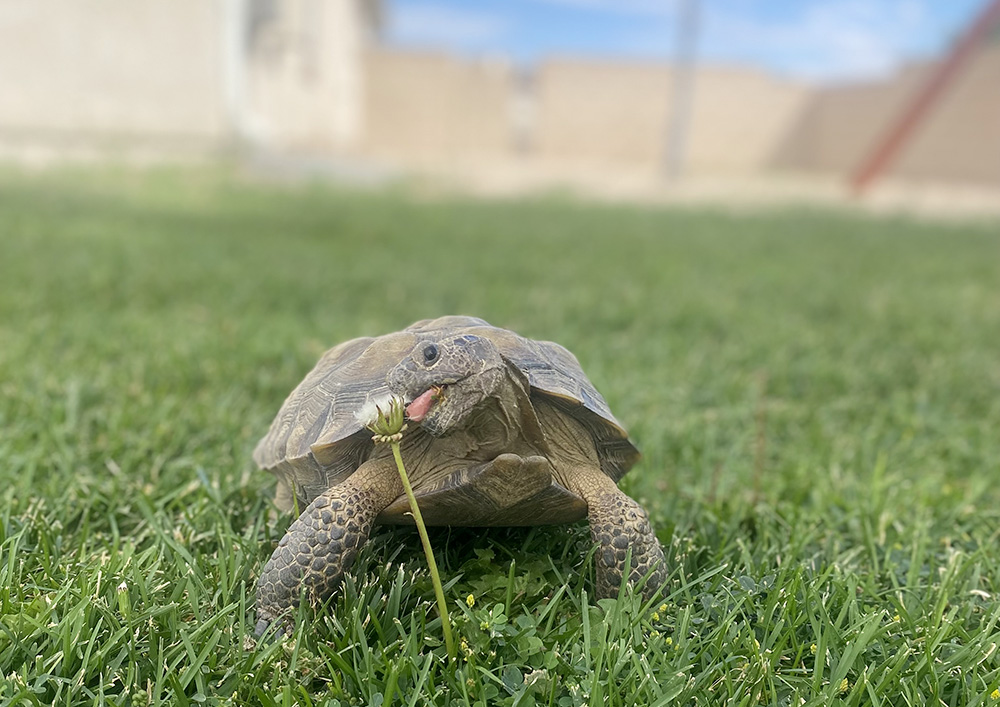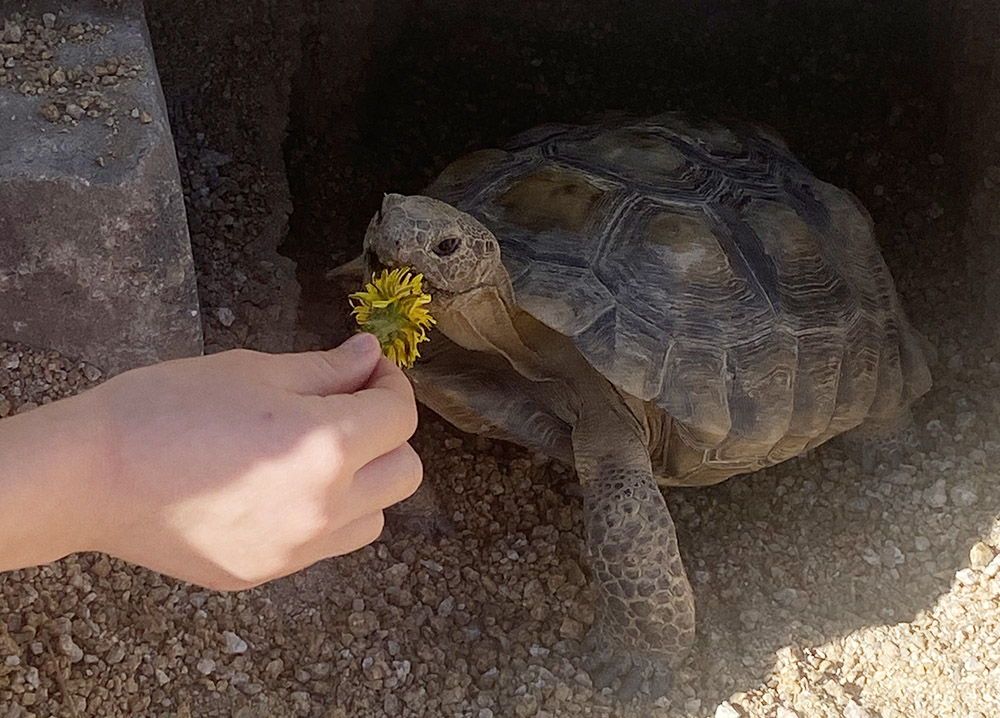
Desi, a 12-year-old Mojave desert tortoise who is part of the Edwards Air Force Base Desert Tortoise Adoption Program, eats a dandelion. Mojave desert tortoises have seen their numbers dwindle as a result of human interactions such as urbanization, energy management and agriculture, as well as from natural predators. (Courtesy of Katie Lemaire)
Advent can be a tricky time. I feel pressure to prepare as best I can for Christmas. My scrupulous self cannot help but feel that no matter what I do, I am not doing Advent correctly. I have tried Jesse Trees, devotionals and mini-retreats, but none have helped me escape the feeling of not being ready.
I know Advent is a time of waiting. But I often wonder, what am I waiting for?
The messaging of Advent implies we're waiting for Jesus' birth. Beautiful crèches, Nativity playsets, and songs of shepherds reinforce our yearning for this most holy night. But in reality, this event has already happened. What we are actually waiting for is the second coming of Christ, when he will return in glory and sweep us up into heaven.
What if the Parousia with its trumpets and rapture fill us with more fear than hope? Sheep and goats and wailing and gnashing of teeth can feel overwhelming and downright nightmarish.
Is there a more accessible way to approach the season? Is it possible that we can turn our hearts to more tangible moments of waiting, for something smaller but nonetheless life-changing and important?
I know Advent is a time of waiting. But I often wonder, what am I waiting for?
My musings on waiting are put in a new perspective this year through the experience of caring for my pet endangered species, a Mojave desert tortoise named Desi.
My family is currently stationed on Edwards Air Force Base in the deserts of Southern California. In July 2023, through the base adoption program, we became the adopted parents of a young Mojave desert tortoise.
Mojave desert tortoises have been considered an endangered species since 1990 and have seen their numbers dwindling as a result of human interactions such as urbanization, energy management and agriculture, as well as from natural predators.
Baby desert tortoise shells are soft until age 3, so they are easy prey for ravens. It is estimated that five out of 100 hatchlings survive to adulthood.
In a conservation effort, Edwards Air Force Base in Kern County, California, has a desert tortoise adoption program serving as outreach and education. The same group of tortoises, bred in captivity, has been circulating the base housing community for years.
Desert tortoises brumate in their burrows from late October until early April, so in late September, I found it odd that Desi was spending more and more time under a bush in the backyard. I worried about an early sleep. After two days, she emerged and laid an egg.
Advertisement
No one had mentioned in any literature that tortoises drop eggs like chickens. I emailed Desi's assigned biologist. This correspondence led both of us, and the entire environmental management office, on an epic learning adventure.
The biologist seemed baffled. Desi was young, born in captivity about 12 years ago, and had never mated that we knew. The subsequent x-ray at the vet confirmed our suspicions: Desi had five eggs incubating inside her. She became a bit of a celebrity around the base.
"Was this a miracle?" I asked myself. Is Desi the Virgin Mary of the chelonian world?
It turned out the eggs were not fertilized. Over the course of this ordeal, the biologists learned that it is rare but not unheard of that captive tortoises lay unviable eggs.
We returned home, where Desi was prescribed an indoor habitat with lights and heat to keep her awake, a calcium supplement we had to forcefully administer twice a day, along with crumbled up antacids on top of her food, all meant to prompt her system to expel the eggs.
According to the biology team, it could be dangerous for the eggs to remain inside Desi during brumation. If tortoises go to sleep with undigested food in their stomachs, it can rot inside their guts during the winter, so the same approach was taken regarding the eggs. It was best practice to trick her into thinking it was still summer with plenty of time to lay.

Desi, a 12-year-old Mojave desert tortoise who is part of the Edwards Air Force Base Desert Tortoise Adoption Program, eats a dandelion. Mojave desert tortoises have been considered an endangered species since 1990. (Courtesy of Katie Lemaire)
After a few weeks with no progress, she was taken back to the vet where she was administered an oxytocin shot to induce her labor. It did not work. Back home she came to her tortoise hotel and to me obsessing over her well-being.
A voice cries out in the desert (it's me): "How long, O Lord?"
At any given time, you are likely to find me sitting on the floor, searching for any change in Desi's behavior, any hint of a strain or a push. Is she ok? Is she lethargic? (She is a tortoise, after all.)
As I sit beside Desi rubbing her shell or researching how to induce labor in a creature when you cannot give it spicy food or have it walk on the edge of the sidewalk (tactics that allegedly work for humans), I cannot help but reflect on Scripture ruminations on waiting.
The Bible is rife with verses about waiting. St. Paul in his letter to the Romans talks about the suffering we endure during the wait. Yearning for the glory that will be revealed to us, he believes we will look back at the hard times as nothing in comparison.
He writes, "We know that all creation is groaning in labor pains even until now," anticipating a rebirth in glory.
The prophet Habbakuk puts this epic waiting game into words that, surprisingly, feel more relatable to me (I do not often look to Habbakuk when I feel in the spiritual weeds): "For the vision still has its time, presses on to fulfillment, and will not disappoint; if it delays, wait for it, it will surely come, it will not be late."
We are not wrong to feel frustration for something trivial in the grand scheme of salvation history. Will Desi's eggs change the world? No. But for her, it could be a matter of life and death.
If I'm waiting impatiently for a creature to lay eggs, how distraught the early Christians must have been waiting for Jesus to come back, not realizing that his metaphoric speech may stretch the timeline out significantly.
Seemingly nondescript moments of waiting are tangible all around me and those I love — word on a new job, an acceptance letter, an approval from insurance for life-saving care, waiting for eggs to be expelled. And I have found these small, relatable situations of waiting do more for my Advent preparation than most anything else. They are reminders that God's creation is replete with miracles and mysteries.
There is no right way to wait. We are not wrong to feel frustration for something trivial in the grand scheme of salvation history. Will Desi's eggs change the world? No. But for her, it could be a matter of life and death.
Should we feel guilty for waiting for such minor things when people are waiting for hostages to be released or to hear if their loved ones have cancer? I say no, because thinking of their frustrations while we think of ours can be like a prayer. It is a moment of connection and solidarity in a time of pause. It matters to us, and it matters to God.
I sit and wait with Desi, as I sit and wait for the coming of Christ, as I think of all of those around the globe who wait for redemption. They endure, so shall I. I will endure in my desire for a fulfilling life here on Earth. I will endure knowing that God hears my trivial requests. That is Advent to me, and that is good.






